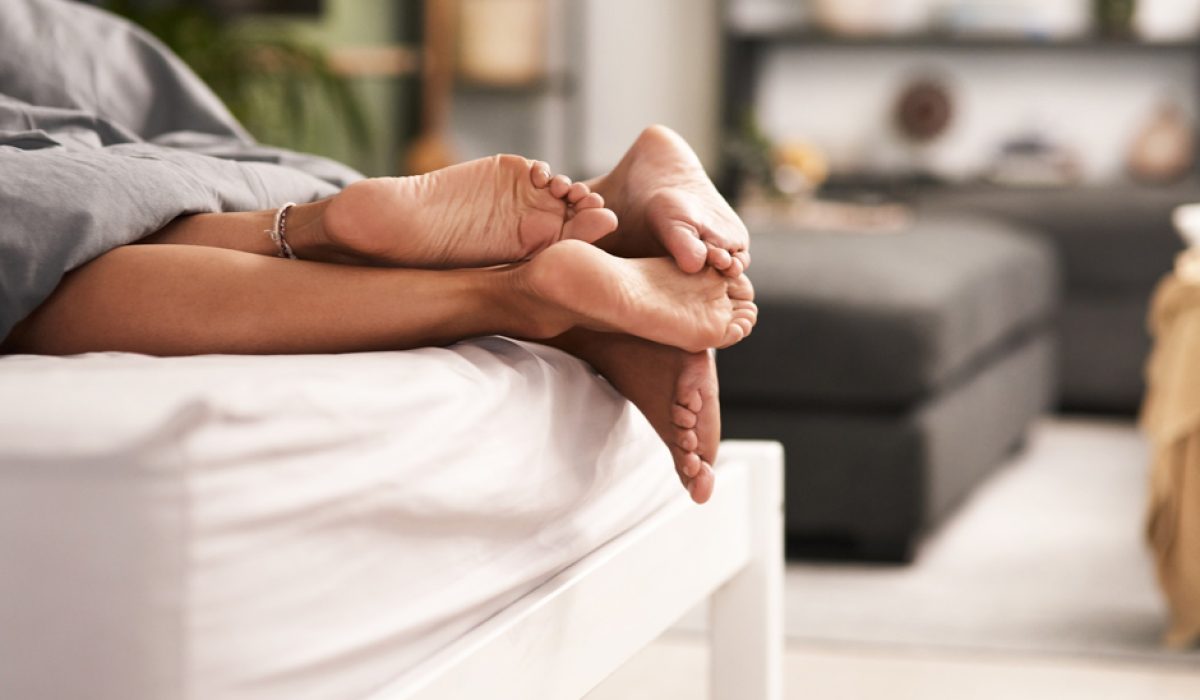It’s supposed to be fun but every time you try to have sex, it hurts. Perhaps you’re feeling a ‘brick wall’ sensation that makes penetration impossible. So why does it sting when I have sex? If you’ve been experiencing pain during sex for a while, you’re probably feeling increasingly disheartened. And to top it off, for many women stinging during sex gets worse over time. There are a number of possible causes for pain during sex but there’s a key one you might never have heard of: vaginismus. Here we break down the possible causes of stinging during sex, what you can do about it, and vaginismus treatment.
Is it normal to experience pain during sex?
Simply, no. Sex should be comfortable and enjoyable. Sadly, many women who experience stinging during sex have simply accepted it or resigned themselves to a life without intimacy. But the truth is you don’t have to suffer. If you are experiencing pain during sex, it means there is a problem. But the good news is that the problem will have a solution!
Why does it sting when I have sex? Possible causes.
- Sexually transmitted infections (STIs) – Is it possible you could have an STI? Many STIs can cause pain during sex, including chlamydia, gonorrhoea and herpes. If there’s a possibility, you should seek sexual health screening.
- Insufficient arousal perhaps because of not enough foreplay, which makes for vaginal dryness, which in turn creates fiction and stinging upon penetration.
- Vulvodynia – A condition you’ve probably never heard of, vulvodynia is characterised by continuous pain in the vulva or vagina that isn’t a clear symptom of another condition. The pain can also radiate out to the buttocks and thighs. There are many possible causes of vulvodynia and experts are still unclear as to exactly why it happens. Treatment for vulvodynia varies and may include nerve blocking, oral or topical medication, and even physical therapy.
- Hormonal shifts – Hormonal balance can affect a woman’s vagina. Indeed in the menopause a woman’s levels of oestrogen drop, which can lead to a thinning and drying of the vagina’s tissue, creating friction and stinging during sex. Lubricant can be beneficial, but if your pain during sex is hormone-related, additional treatments are often recommended. Your doctor or a gynaecologist can advise.
- An undiagnosed hymen abnormality meaning there is insufficient space for penetration. It is important to note that a problem such as this is rare, and statistically the problem is more likely to be something else such as vaginismus. Examination by a doctor or gynaecologist can rule this out, but if it is what’s causing the problem, surgery can resolve it.
- Thrush – A very common yeast infection, in addition to thick white discharge, thrush causes itching. It can also create stinging during urination, discomfort around the labia and pain during sex. If you have symptoms of thrush, it can be swiftly treated with a course of medicine from your pharmacy.
- Vaginismus causes pain during sex because of involuntary contractions of the muscles surrounding the vagina. These spasms make it difficult or even impossible to have penetrative sex, and for some women even to use tampons or undergo a cervical smear test. You may feel as though there is insufficient space in your vagina to have sex or insert a tampon. Some women have had this problem since they first attempted sex, while others develop it later after years of sexual activity without issue.
What is vaginismus? The hidden condition you’ve probably never heard of
Vaginismus is a psychosexual problem in which the muscles surrounding a woman’s vagina contract involuntarily in response to attempted penetration, causing pain. These contractions begin with a fear of penetration but become a conditioned reflex that make sex incredibly painful or impossible, meaning sufferers often forego intimacy and can’t even have a cervical smear test or use tampons. Women with vaginismus talk of the feeling of hitting a brick wall when attempting to have sex or use tampons, and the sense that there isn’t enough space inside their vagina.
Some women have this problem early on, while others develop it later in life after years of enjoyable intimacy. So what causes vaginismus? It is not always known but possible catalysts for vaginismus include:
- An unpleasant or traumatic sexual experience
- Trauma from giving birth
- A distressing medical examination
- Beliefs about sex being shameful or wrong
- A condition that causes vaginal discomfort such as thrush, or frequent urinary tract infections
Dr Alex Eskander, one of the UK’s leading Consultant Gynaecologists at The Gynae Centre says: “Vaginismus can impact a woman’s life enormously – chipping away at intimacy, relationships and self-confidence. It is more prevalent than people realise and here at The Gynae Centre we treat many women who have suffered in silence for years before reaching out. They often speak of having accepted they could never have sex or get married. But thankfully, and contrary to what many people think, effective vaginismus treatment is available – you don’t have to suffer.”
What to do if you’re experiencing pain during sex
Don’t bear it in silence – this isn’t simply ‘how sex is supposed to be’. See a doctor, preferably a specialist. Every day, gynaecologists are used to dealing compassionately with such a sensitive area of the body. Ideally you’ll have a thorough consultation in which you explain what’s been happening. Other problems can then be ruled out. If this condition is indicated, you can then seek effective vaginismus treatment.
While it is classed as a psychosexual condition, vaginismus contractions are involuntary. Vaginismus may begin ‘in the mind’ but the condition becomes very much physical. As such, effective vaginismus treatment should encompass physical intervention.
Revolutionary vaginismus treatment with 90% success rate
Conventionally, vaginismus treatment has been some mixture of talking therapies, relaxation techniques, pelvic floor exercises, and vaginal dilators to try to help a patient gradually get used to penetration. These techniques have had mixed results. For women with vaginismus, especially those very severely afflicted, trying to ‘relax’ and progressively ‘get used to’ penetration is often impossible because they are trapped in the vicious cycle of contraction=pain=more contraction=more pain.
But now, there is a leading-edge vaginismus treatment that has been found to break that cycle – Botox.
Botox breaks the vicious cycle of tension=pain=more tension=more pain. Once Botox is administered to temporarily relax the muscles around the vagina, a woman is able to experience sex without pain. Then once she is able to have sex without pain, she begins to relax and experience pleasure, and her muscles become conditioned to relax on their own. In this way, Botox vaginismus treatment instigates a virtuous cycle, and we have success rates of 90%. Here at The Gynae Centre, as experts in vaginismus treatment we are pleased to offer this breakthrough intervention.
What happens in Botox vaginismus treatment?
Prior to treatment, we will rule out any other problems and investigate to determine which vagina muscles are spasming the most – it is those that we will work on.
Botox treats vaginismus by relaxing the vagina muscles that are spasming and preventing penetration. Vaginismus treatment with Botox is conducted under sedation to avoid further trauma.
With the use of very fine needles, Botox is injected only into three specific vagina muscles in the side walls that are stopping penetration, avoiding the urethra and rectum. This works to relax the muscles that are spasming. The patient can then gently introduce dilators to the vagina until she is ready for sex.
At The Gynae Centre we find that usually only one Botox vaginismus treatment is necessary. The Botox lasts for about four months, and for most women in that time the cycle of muscle relaxation=pleasant sex=muscle relaxation=pleasant sex (and so on) will be underway – her vagina muscles will have learned to relax on their own.
If you are experiencing pain during sex, you don’t have to suffer or forego intimacy. Many women have tried everything by the time they come to us – from yoga to meditation and talking therapies or even getting drunk – and nothing worked. But Botox vaginismus treatment has around a 90% success rate. You don’t have to live like this.
The Gynae Centre is home to some of the UK’s leading gynaecologists who work compassionately for women’s health day in day out. For a consultation call 020 7580 8090 or book online.






